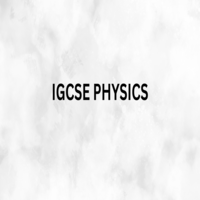The International General Certificate of Secondary Education (IGCSE) Physics is an internationally recognized qualification that provides students with knowledge of physics concepts and applications. It provides a basis for further study in physics and other subjects and is valued by universities and employers worldwide for the thinking and skills it develops
WHO IS IT FOR?
IGCSE Physics is designed primarily for students aged 14 to 16 but is also suitable for a general audience interested in understanding the fundamental laws of the natural world. Whether you’re a young person looking for a career in science or engineering, or you just want to know how the world works, this course can help you.
WHY IS IT IMPORTANT?
From the development of renewable energy to advances in medical imaging, physics underpins many modern technologies and industries. An understanding of physics is essential for many education and career paths in the science, technology, engineering, and mathematics (STEM) fields. In addition, studying physics develops a sense of inquiry, problem-solving, and critical thinking that is useful in all fields.
SYLLABUS OVERVIEW
The IGCSE Physics curriculum is designed to be comprehensive and accessible; It ensures that students have a solid understanding of basic concepts without being overwhelmed. Here is an overview of the main areas covered
MECHANICS
This includes strength, movement, power, and performance work. Students learn the basic principles that explain how objects move and interact.
WAVES
Understanding waves is important in physics, including everything from sound waves in the air to electromagnetic waves like light. This section describes the properties, behavior, and use of waves.
ELECTRICITY AND MAGNETISM
These chapters examine the fundamentals of electricity, fields, circuits, and magnetism, providing the foundation for understanding today’s electronic devices.
THERMAL PHYSICS
his field studies the laws of heat, temperature, and thermodynamics, which explain how energy varies and changes in various states of matter.
ATOMIC PHYSICS
Students explore the structure of the atom, radioactivity, and nuclear physics to uncover the building blocks of the universe.





